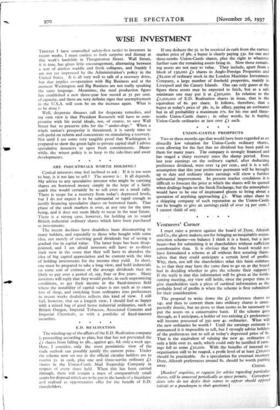* * * * ARE INDUSTRIALS WORTH HOLDING ?
Cynical investors may feel inclined to ask : If it is too soon to buy, is it too late to sell ? The answer is : It all depends. My advice to any speculative investor who might be carrying shares on borrowed money simply in the hope of a fairly quick rise would certainly be to sell even on a small rally. There is scope for a recovery from today's depressed levels, but I do not expect it to be substantial or rapid enough to justify financing speculative shares on borrowed funds. That phase of the stock markets is over, at any rate for the time being, and it does not seem likely to recur in the near future. There is a strong case, however, for holding on to sound British industrial ordinary shares which have been purchased as investments.
The recent declines have doubtless been disconcerting to many holders, and especially to those 'who bought with some idea, not merely of receiving' good dividends but of seeing a gradual rise in capital value: The latter hope has been disap- pointed, and I am afraid investors will have to re-direct their view in the sense that they will have to abandon the idea of big capital appreciation and be content with the idea of holding investments for the income they yield. In short, one must be prepared to take a' long view, and hold industrials on some sort of estimate of the average dividends they are likely to pay over a period of, say, four or five years. Many investors will reply that they would prefer, in such unpromising conditions, to get their income in the fixed-interest field where the instability of capital values is not such as to cause loss of sleep, and switching from ordinaries into preferences in recent weeks doubtless reflects this kind of view. I still feel, however, that on a longish view, I should feel as happy with a mixed bag of good home industrial ordinaries, such as British Oxygen, Imperial Tobaccos, Associated Cements and Imperial Chemicals, as with a portfolio of fixed-interest securities.














































 Previous page
Previous page